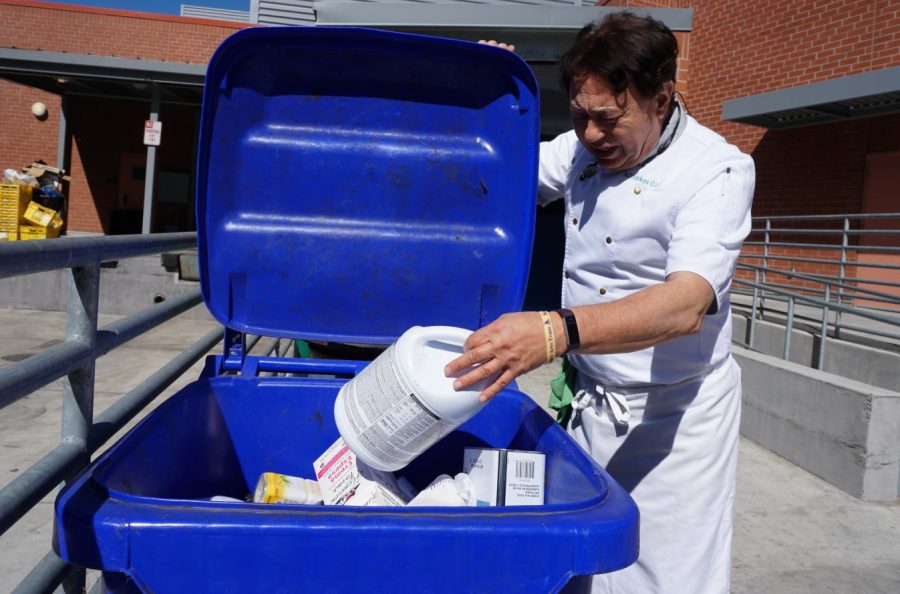Sustainability committee embraces green initiative
Daniel Hernandez / The Advocate
Culinary department Chairperson Nader Sharkes places plastic waste in the recyclable container adding to his department’s focus on decreasing the carbon footprint of the campus.
Mar 4, 2020
One group here on campus is responsible for the installation of new drinking fountains and getting departments to have green certification with the intention of reducing greenhouse and carbon emissions.
Buildings and Grounds Manager Bruce King is the chairperson of the Contra Costa College Sustainability Committee. He said their goal is to reduce the energy consumed from things such as cars, lights and air conditioning and highlight the importance of recycling on campus.
The committee sits together to merge ideas about how they and the campus can effectively take steps to becoming more environmentally friendly and sustainable within budget.
The committee does not require commitment to be a member, but King encourages the exchange of ideas and suggestions to start working on new projects.
Any and all students, staff and faculty are welcome to join the committee’s meetings.
“We try to open up the committee to the whole campus,” King said. While there are several members who represent different departments on campus, such as English or automotive, the amount of student participation has remained stagnant since the 2018-19 academic year.
King plans to bring the question to the committee next meeting to see if they can increase student awareness and participation.
King notes that the issue of timing tends to affect the outcome of their meetings. With many participants having busy days, everyone comes to the agreement that a Thursday, 7 a.m. meeting time works out.
Meetings are held on the first Thursday of every month in the R Building (the Buildings and Grounds portable south of the Applied Arts Building) conference room.
“I try to make it enjoyable. We’ll often bring in guest speakers and the biggest continental breakfast you’ve even seen,” King said referring to the large number of snacks and coffee that appear in each meeting.
At the first meeting of the semester on Feb. 6, guest speaker Susan Psara, hazardous waste reduction manager for the office of Contra Costa County, discussed how departments on campus can receive a Green Business Certification.
So far, CCC has custodial, both divisions of the Automotive Services Center and Buildings and Grounds departments with certification.
Culinary arts department Chairperson Nader Sharkes, an active member of the Sustainability Committee, is interested in becoming the fifth department on campus to become certified by the county.
According to Psara, to be certified, an entity must go to the California Green Business Network’s website to register details about their operations. The website will then generate a specific checklist for facilities to follow.
The list covers water and energy conservation, solid waste reduction and transportation management.
“Once they finish that checklist, simply filled out but doesn’t have to be complete, a green business coordinator like myself would go out there and verify what checklist items have been completed,” Psara said.
A representative from the county has already made a visit to culinary arts department.
“The only thing we need to do is fill out the application,” Sharkes said.
He does not have a definite time of when they will finally become certified.
Through the application process, Sharkes teaches his students several ways to practice sustainable cooking habits in the kitchen and at Pronto.
“Right now, we recycle almost everything. We compost all our food byproducts and we recycle our (cooking) oil.”
The way they recycle their oil is by keeping grease a container that is built into the kitchen where used oil is strained into a receptacle.
The remainder is clean and ready-to-use cooking oil. The rest is placed in a special bin for a disposal service to take away.
There are extra costs for when it comes to investing in sustainability. At Pronto cafe, the use compostable paper plates are costly in comparison to buying traditional paper plates.
Sharkes is trying to implement red serving baskets for food when Pronto patrons decide to eat there.
Culinary arts major Penny Chuah, who serves as a baker in the kitchen, said, “When we do vegetables, we cut everything. We have leftovers. The head and the bottom, we go for the soup. After making the soup, we go for the compost.”
The maximization of everything edible is not only eco-friendly but cost-effective and boosts students’ kitchen skills.
Instead of automatically sending waste to landfill, they mindfully compost items such as eggshells, paper-based cartons, coffee grounds and vegetable scraps.
“I’m so glad that I don’t have to feel guilty,” Chuah said in reference to composting.
“We want to show the community a good example that we can be a futuristic, modern institution of education and we are right up on everything,” King said.



